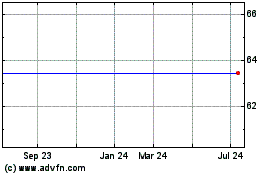FDA Officials Not Sure Agency Will Approve Direct-To-Consumer Genetic Tests
July 16 2010 - 4:59PM
Dow Jones News
Top Food and Drug Administration officials suggested they would
set a high, if not impossible, bar for companies seeking to sell
genetic tests directly to consumers.
In an interview, Jeffrey Shuren, head of FDA's medical-devices
division, and Alberto Gutierrez, who oversees the FDA unit that
regulates certain laboratory tests, said they considered
direct-to-consumer genetic tests "high risk" and have already
informed companies selling such tests through their websites that
they must seek FDA approval.
Although the FDA hasn't ordered existing tests off the market,
Shuren suggested it could be difficult to gain agency approval. The
agency is convening a two-day public hearing starting Monday to
discuss how it would regulate diagnostic tests, including
direct-to-consumer tests.
Shuren said he was concerned about cutting doctors out of the
process of interpreting laboratory tests and afraid consumers could
make risky medical decisions based on information that suggests
they are at risk of developing cancer, diabetes or other diseases
or could stop taking a needed medication.
The issue came to light in May after Pathway Genomics Corp., a
closely held firm based in San Diego, announced plans to sell its
Insight Saliva Collection Kit through Walgreen Co. (WAG) and CVS
Caremark Corp (CVS). Both retailers backed out of plans to sell the
test after the FDA raised concerns.
The Insight Saliva and similar tests such as ones sold by other
California firms, 23andMe Inc. and Navigenics Inc., are designed to
predict a person's risk for developing certain diseases or how they
might respond to certain drugs. They can also be used to predict
the risk of certain diseases caused by recessive genes that might
be passed to a child from parents.
Shuren noted that the FDA has so far declined to approve an
over-the-counter HIV test partly on concerns that test results
would be first seen by a consumer and not a doctor.
"The question is what's the benefit to consumers," Shuren
said.
Pathway recently changed course and now requires its test to be
ordered through a physician.
Traditionally, FDA has regulated laboratory tests that are sold
to hospitals and doctor's offices along with over-the-counter tests
like blood glucose test strips, but it hasn't required approval for
so-called laboratory-developed tests that fall under a system
regulated by the Centers for Medicare and Medicaid Services.
CMS certifies laboratories, but if a test is analyzed in the
same lab, it traditionally hasn't required FDA approval because
such tests were considered low-risk and easy to understand.
But now that such laboratory-developed tests can predict a
person's risk for cancer recurrence or the risk of developing other
diseases, FDA officials say those should go through the
FDA-approval process.
The move will affect several other companies including Quest
Diagnostics (DCX) and Laboratory Corporation of America (LH), or
LabCor, and Genomic Health Inc. (GHDX), which sells a test that's
well regarded in the medical community for predicting the risk of
breast-cancer recurrence.
The American Clinical Laboratory Association, which represents
laboratories, said it believes that current regulations do need to
be updated, but said it was concerned that if current FDA
medical-device regulations are applied to lab tests that it might
impede the development of "cutting edge tests."
-By Jennifer Corbett Dooren, Dow Jones Newswires; 202-862-9294;
jennifer.corbett@dowjones.com
Genomic Health (NASDAQ:GHDX)
Historical Stock Chart
From Mar 2024 to Apr 2024

Genomic Health (NASDAQ:GHDX)
Historical Stock Chart
From Apr 2023 to Apr 2024
